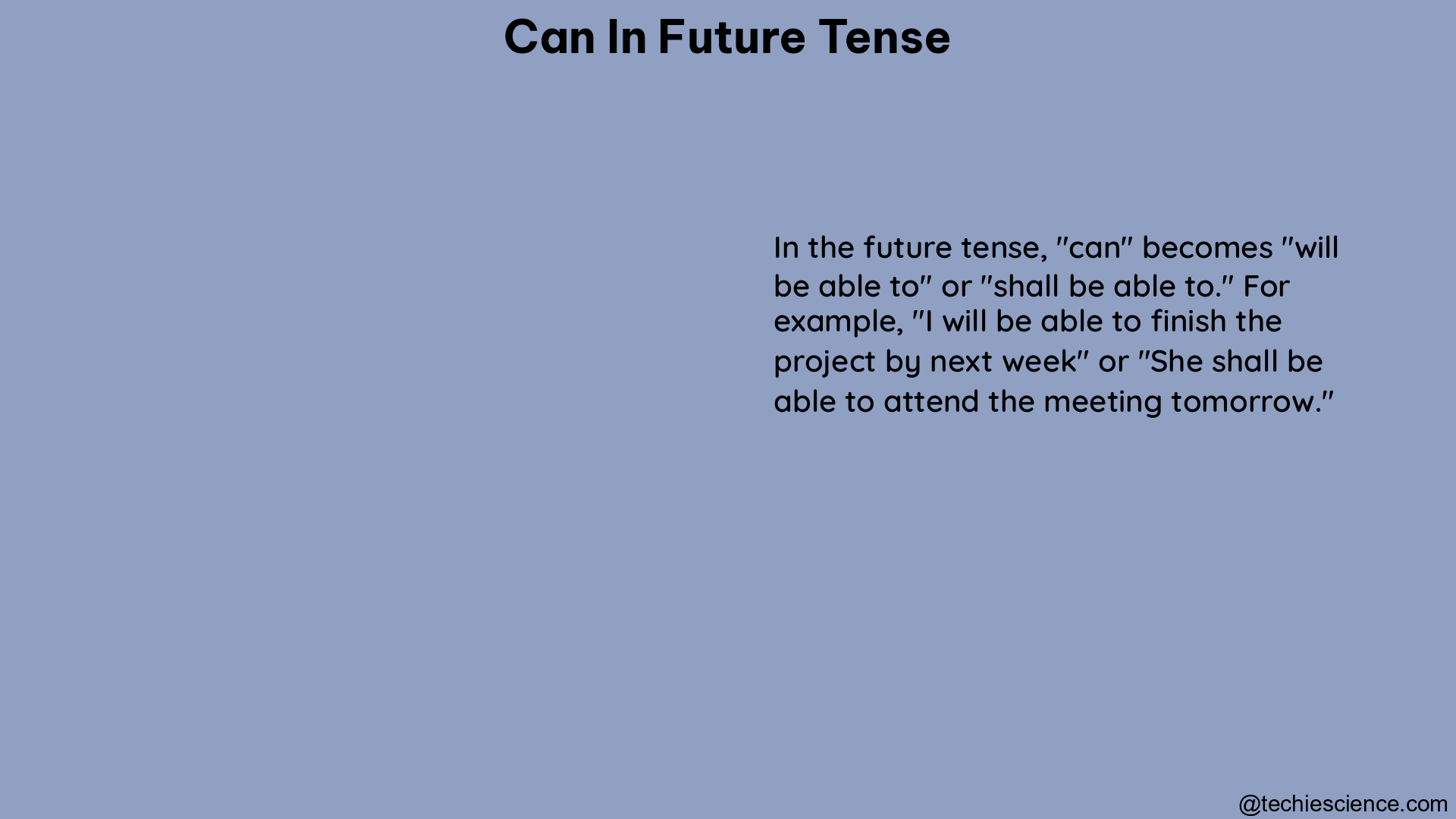The future tense of the modal verb “can” is a crucial aspect of English grammar that can often confuse language learners. Instead of using “can” directly with the future auxiliary verb “will,” the periphrastic construction “will be able to” is employed to convey the idea of ability or possibility in the future. This comprehensive guide will delve into the intricacies of using “can” in the future tense, providing you with a deep understanding of the topic.
Understanding the Fundamentals
The modal verb “can” is used to express ability, possibility, or permission in the present tense. However, when it comes to the future tense, the structure changes. This is because “can” cannot be directly combined with the future auxiliary verb “will.” Instead, the phrase “will be able to” is used to convey the future tense of “can.”
Forming the Future Tense of “Can”

To form the future tense of “can,” you need to use the phrase “will be able to.” This construction consists of the future auxiliary verb “will” followed by the verb “be” and the adjective “able,” and then the infinitive form of the main verb.
Here are some examples:
- I will be able to finish the project by the end of the week.
- She will be able to speak fluent French after taking the language course.
- They will be able to attend the concert if they get the tickets in time.
Negating the Future Tense of “Can”
To negate the future tense of “can,” you need to use the phrase “will not be able to” (or the contracted form “won’t be able to”).
Examples:
- I won’t be able to attend the meeting tomorrow.
- She will not be able to travel to the conference due to a family emergency.
- They won’t be able to go on the field trip if they don’t get their permission slips signed.
Forming Interrogative Sentences
To form interrogative sentences with the future tense of “can,” you need to use the phrase “will be able to” with subject-verb inversion.
Examples:
- Will you be able to help me with the homework tonight?
- Will she be able to pass the exam if she studies hard?
- Will they be able to attend the party this weekend?
Expressing Uncertainty and Possibility
The future tense of “can” can also be used to express uncertainty or possibility about one’s ability to do something in the future.
Examples:
- I will be able to try my best to finish the project on time.
- She may be able to join us for dinner if her schedule allows.
- They might be able to find a solution to the problem if they work together.
Combining with Other Modals
The future tense of “can” can also be combined with other modal verbs to express more complex ideas about ability and possibility in the future.
Examples:
- I will be able to should be able to complete the task by the deadline.
- She will be able to might be able to attend the conference if her boss approves the request.
- They will be able to could be able to take the trip if they save enough money.
Contextual Usage and Examples
The future tense of “can” can be used in a variety of contexts to discuss future abilities, possibilities, and permissions. Here are some more examples:
- Will the new employee be able to learn the software quickly?
- I won’t be able to go to the party because I have a prior commitment.
- Will the students be able to finish the exam within the allotted time?
- She will be able to apply for the scholarship if she meets the eligibility criteria.
- They won’t be able to travel abroad this year due to budget constraints.
- Will the team be able to win the championship if they train hard?
Mastering the Future Tense of “Can”
Mastering the future tense of “can” is essential for effective communication in English. By understanding the proper structure, negation, and interrogative forms, as well as the various contextual usages, you can confidently express your abilities, possibilities, and permissions in the future.
Remember, the key to success is consistent practice and exposure to the language. Engage in conversations, read extensively, and pay close attention to how the future tense of “can” is used in different contexts. With dedication and persistence, you’ll soon become a pro at navigating the complexities of the future tense of “can.”
References:
- https://forum.lingq.com/t/the-future-tense-of-can/17882
- https://blog.abaenglish.com/the-future-of-modal-verb-can/
- https://ell.stackexchange.com/questions/69865/how-can-i-say-can-in-the-future-form

Hi…. I am Goutam Datta. I have completed a double M. A. in English and B. Ed. I am a creative writer. Currently, I am a part of the LambdaGeeks.